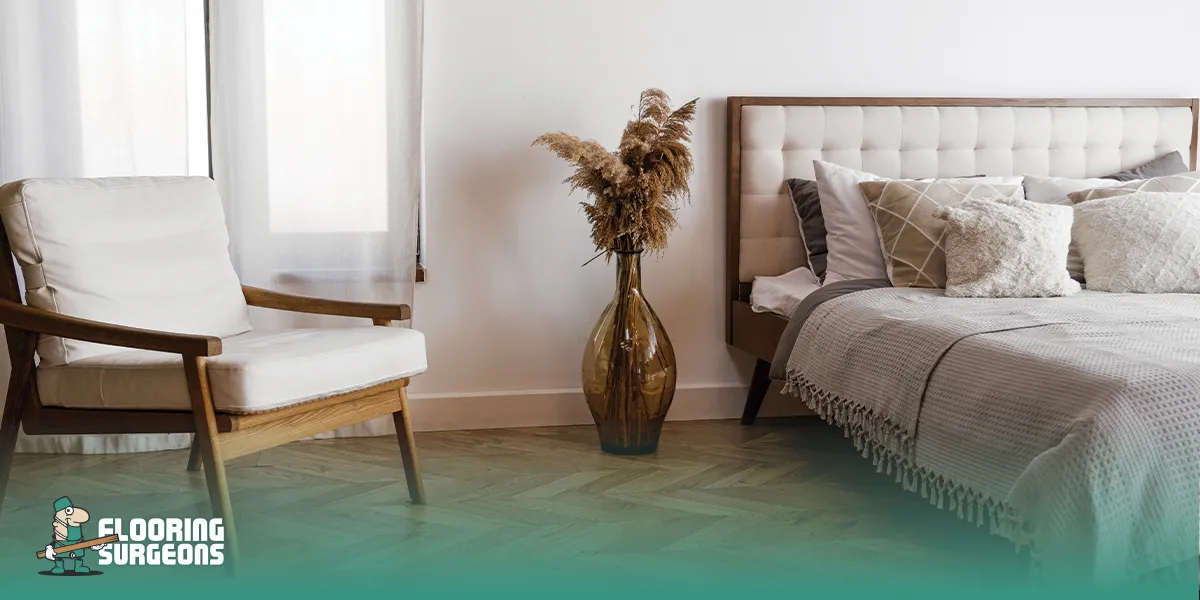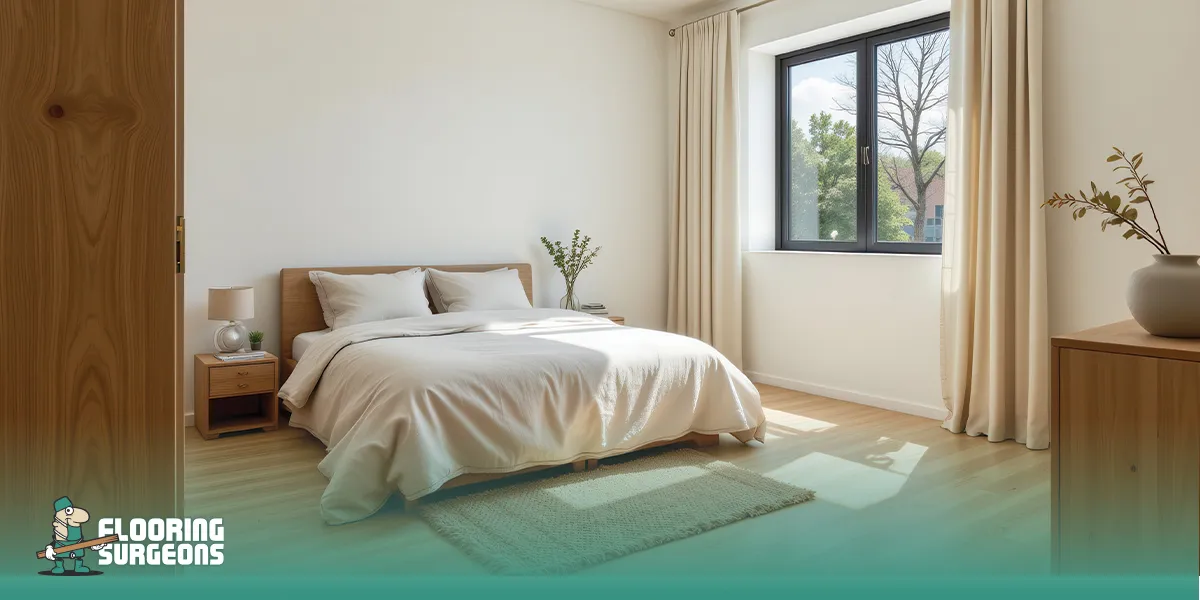Yes, it’s one of the best choices for modern bedrooms. When paired with the right underlay, laminate offers a warm, wood-like finish that is low maintenance and provides excellent sound insulation. Additionally, it’s hypoallergenic, making it an ideal choice for individuals who are sensitive to dust or pet dander.
Tones of natural oak or warm grey are best suited to matte or textured finishes. These surfaces softly scatter light, creating a calm, grounded mood. It is best to avoid overly glossy options, as they can make a cold, reflective feel in a bedroom.
Yes, of course. It is possible to heat laminate floors to 27°C using underfloor heating. To ensure even heat distribution and prevent expansion gaps, use a thermal underlay specifically designed for radiant systems.
No, not necessarily. Compared with carpet, laminate maintains warmth more efficiently and stays comfortable year-round when combined with an underlay, such as a thermal or foam underlay. As a bonus, laminate adapts to room temperature more quickly, so it won’t remain cold for long.
Laminate flooring in light oak, ash, or pale grey is a good choice. The room appears larger with these shades, as they reflect more light. To make the room “breathe,” avoid high contrast between the walls and floors; similar tones keep the visual flow uninterrupted.
A laminate floor in a bedroom can last 12–15 years, sometimes even longer, if it is used moderately and appropriately cleaned. Because bedrooms are less frequently used than living areas, quality AC4 or AC5 laminate often retains its appearance new after its warranty expires.
The flooring in a bedroom is not just about its appearance; it also plays a significant role in defining the room’s mood. It is essential to note that laminate flooring for bedrooms is designed explicitly for bedrooms. Unlike hallway carpeting or kitchen laminate flooring, this product does not attempt to make itself tough or moisture-proof. Instead, it is tuned to evoke a sense of stillness, warmth, and quiet—the kind of qualities you notice not as soon as you walk in, but when you slow down.
The unique characteristic of laminate flooring for bedrooms is its ability to absorb sound and regulate temperature, which sets it apart from laminate flooring used in other rooms of the house. Because of its layered structure, it slightly softens footsteps, dulls echoes, and retains a few degrees of warmth in the room. In other words, you don’t hear the floor; you feel it—like a subtle, calming background that supports the rest of the design.

From a design perspective, this type of laminate serves as a “visual softener,” diffusing light rather than reflecting it, thereby making the environment feel more pleasant, particularly under bedside lighting. This is why interior designers often use laminate in bedrooms to control both the atmosphere and the room’s style.
Therefore, if the living room floor is supposed to impress, and the hallway floor is supposed to endure, the laminate flooring for the bedroom is supposed to comfort you quietly, doing its job so perfectly that you barely notice that it is there.
A floor’s size changes how a room feels, and laminate flooring for bedrooms helps you fine-tune that visual balance. In smaller spaces, soft tones are key to creating an open and calm atmosphere. Shades like pale oak, ash, and light grey reflect natural light, visually expanding the room and softening its corners. To add depth and rhythm, consider narrow planks or subtle herringbone layouts — they draw the eye across the floor, making the space feel more dynamic and inviting. For a modern yet airy look, explore our range of grey laminate flooring, perfect for brightening compact bedrooms without losing warmth.
It is not the light itself that poses a challenge in larger bedrooms, but rather the scale of your space. There is nothing better than wide-plank laminate for grounding a room and maintaining its proportions. Especially in rooms with sparse furniture, wide boards don’t look overly crowded. Deeper tones, such as smoked oak or warm walnut, can create a more intimate atmosphere in large areas, particularly when paired with soft lighting and textured rugs.
Here’s a clever trick designers use that most people don’t think about: align the laminate planks in your living room so that they face the light source, such as a window or balcony door. Small bedrooms benefit from this, as it expands the perspective, while larger bedrooms benefit from it, as it subtly anchors furniture placement.
When it comes to installing laminate flooring in bedrooms, the process is often more straightforward than most people think. However, even small choices — such as the direction of the planks, the type of underlay, or the tone you select — can significantly impact the room’s warmth, acoustics, and overall comfort. For example, choosing light laminate flooring can help brighten the space, reflect more natural light, and create a softer, more relaxing atmosphere that perfectly suits a bedroom setting.
Easy Click-Lock Installation for Bedroom Floors
The laminate used in bedroom cabinets clicks together, eliminating the need for glue, nails, or any other mess. There is no need to glue the planks together, and they float above the subfloor. A bedroom has lower humidity than a kitchen or bathroom, so its joints stay tighter for longer.
Precision is key: a millimetre off at the start line can affect the pattern by the last wall. Thus, even DIY installers should preplan plank direction and test-fit the first row before proceeding.
Choosing the Right Underlay for Bedroom Laminate
Any good bedroom floor would not be complete without underlay. Choose an acoustic or foam underlay for added comfort—it cushions footsteps, reduces echo, and helps retain heat during colder months. Ensure your bedroom has an impact sound reduction rating (IIC) of at least 20 dB if it is located above another living space.
Homes with underfloor heating may also benefit from thermal underlays with built-in moisture barriers, which help regulate the temperature evenly throughout the space.
Professional vs DIY Bedroom Laminate Installation
Detail-oriented homeowners can realistically install laminate flooring in their bedrooms themselves. It’s cheaper to do it yourself, but you’ll need to use accurate cutting tools and make sure the subfloor is level and clean.
It is important to note, however, that professional installation has some underappreciated advantages:
Hiring a fitter may be justified if you are seeking perfection or working with awkward angles (such as bay windows or built-in wardrobes). In contrast, click-lock laminate lets you install it yourself if you have a spare weekend and enjoy working with your hands.

In terms of carpet flooring and laminate flooring for bedrooms, both have their strengths; however, making the right decision depends on how you live in your home.
Having a carpet under bare feet gives you that instant feeling of softness and naturally dampens sound – ideal for people who love the plush, hotel-like feel. There are some pros to this type of material; however, it traps dust, pollen, and moisture, which over time may cause allergies or develop a musty odour.
Laminates, however, trade some of their softness for greater stability. In addition to not collecting allergens, it is easier to clean and maintain its colour for much longer in direct sunlight. In comparison to hours of vacuuming, a simple sweep takes only a few minutes. Families with pets or children will find it much more convenient to use, as it does not collect hair, does not stain, and does not leave a lingering odour.
There is something that few people think about: carpets wear unevenly in the places where you walk the most, whereas laminate ages evenly over the course of its lifetime. As a result, a laminate floor appears calm, clean, and reliable for a decade, rather than one that develops “paths.” So, if comfort is about softness, carpet wins; but if comfort is about calm, clean, and reliable, laminate does.
Budget-friendly laminate flooring gives you the best price-to-longevity ratio of any surface material. At Flooring Surgeons, prices typically range from £14.99 to £29.99 per square metre, depending on the thickness, finish, and brand.
A lightweight, cost-effective laminate that resembles real wood is ideal for guest bedrooms or low-traffic areas. The extra thickness of a 10mm or 12mm laminate makes a big difference in the comfort of your main bedroom. Winter is a better time to use the thicker core because it feels more solid underfoot and provides better insulation.
Compared with solid wood flooring, laminate flooring is easier to install and requires less maintenance. There is no need to sand, seal, or re-oil the floor; sweep regularly and damp mop occasionally. The cost of upkeep alone can save hundreds of dollars over 10 years.

You may want to design your bedroom on a budget, but you don’t want it to look like one. Laminate flooring is an excellent choice: it’s beautiful, functional, and durable.